Prior to moving out to California and Hollywood, Jean Simmons was primarily in British films. This makes sense given that she was British. So Long at the Fair is one of those movies. Depending on your age and interests, however, you may recall her best as Rear Admiral Norah Satie in Star Trek: The Next Generation (Episode: The Drumhead).
Chess games and submarine movies
You might think that movies set on submarines are relatively rare. They are — relatively. But as a quick search online will show you (as it just showed me), there are actually quite a few of them. (Das Boot and Crimson Tide come to mind.) Relative to other movies, they may be rare. But there are quite a few of them nonetheless.
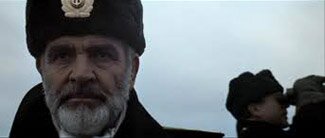 This leads me to the two movies I wanted to bring up: Run Silent, Run Deep (1958) and The Hunt for Red October (1990). I don’t know what the correct term for describing them would be — suspense, thriller, action? I lean toward suspense but what makes them compelling is a phrase Sean Connery’s character, Marko Ramius, uses in Red October: chess game.
This leads me to the two movies I wanted to bring up: Run Silent, Run Deep (1958) and The Hunt for Red October (1990). I don’t know what the correct term for describing them would be — suspense, thriller, action? I lean toward suspense but what makes them compelling is a phrase Sean Connery’s character, Marko Ramius, uses in Red October: chess game.
There is more actual “action,” as in torpedoes and so on, in Run Silent, Run Deep, but neither film has a great deal of it. It’s the drama of the situations and, again in both films, the mystery surrounding a lead character’s motives, Clark Gable’s in Run Silent and Sean Connery’s in Red October.
Both movies get more physically and visually dramatic with action in their final acts but for the most part these chess games are mysteries rather suspense thrillers, though both are suspenseful and, I suppose, thrilling.
However they are described, I like both movies quite a lot and have watched both many times. They are well worth seeing more than once ….
Run Silent, Run Deep (1958)
I saw an interview with the actor Laurence Fishburne the other day in which he was speaking of various influences when he was young. At one point, he brought up the movie Run Silent, Run Deep and Clark Gable. What struck him in the movie was Gable’s gravitas. I immediately thought, “Yes, that is the perfect word for it.” (Read more)
The Hunt for Red October (1990)
In the class of movies known as action-adventure, The Hunt for Red October stands out as one of the best and as one of the strangest because the action is relatively minimal and doesn’t play a huge role in generating the film’s suspense and tension. (Read more)
Key Largo: truly an ensemble movie
After The Big Sleep, John Huston’s Key Largo is my favourite Bogie and Bacall movie. Another good one is To Have And Have Not and the fourth would be Dark Passage, the weakest of them all because it is so wrong-headed.
Key Largo is partly interesting because the famous Bogie-Bacall chemistry is pretty much irrelevant. It may be there, but so what? This movie is about the story, the drama and all the characters. I think we can thank John Huston for that.
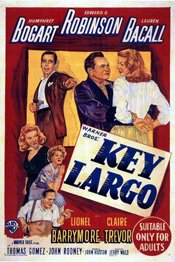 Key Largo (1948)
Key Largo (1948)
Directed by John Huston
Of the four movies Humphrey Bogart and Lauren Bacall made together, Key Largo is the last. What strikes me as interesting about it is how, despite the romance suggested between the characters, Bacall is almost a minor character in the movie. But then, in a sense, so are all the characters.
This is truly an ensemble movie, perhaps because it began as a play. You might expect it to focus on Bogart and Bacall, especially given their fame as a couple, but it doesn’t.
Director (and co-writer) John Huston is more interested in the story.
As the movie plays out, the film seems to hand the lead role off from Bogart, then to Robinson, then to Barrymore, then to Trevor, and then back to Bogart again. At the same time, Huston emphasizes place – in this case, the Florida Keys – as a major character, as he does with the hurricane.
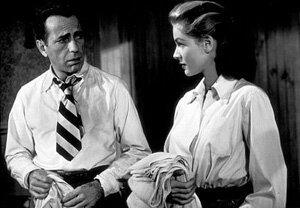 Having left the Army, ex-Major Frank McCloud goes to Key Largo to pay respects to the family of one of the soldiers under his command who was killed in action. McCloud seems a bit aimless having left the army; this obligation he feels to visit the family is about the only purpose he has at this stage in his life.
Having left the Army, ex-Major Frank McCloud goes to Key Largo to pay respects to the family of one of the soldiers under his command who was killed in action. McCloud seems a bit aimless having left the army; this obligation he feels to visit the family is about the only purpose he has at this stage in his life.
The family owns a hotel in Key Largo and when McCloud gets there both he (and we, the audience) sense something is up. Some shady characters are hanging around the hotel and they seem eager for McCloud to leave.
As the movie unfolds, it turns out they are criminals. They take over the hotel as they await other criminals to meet up with them in order to conclude a deal concerning counterfeit money. It also turns out they are led by Johnny Rocco (Edward G. Robinson) who has returned to reclaim his life and position in the criminal world, from which he has been gone for eight years (likely in prison).
Unfortunately for the gang of thugs, this is Florida and it is hurricane season and one is blowing in.
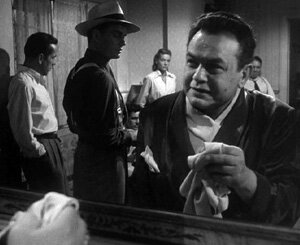 What the movie does is to bring all these characters together in one place and confine them in close quarters. You feel the walls closing in, so to speak, as the winds get stronger and shutters are closed. They are all closed in; sunlight vanishes.
What the movie does is to bring all these characters together in one place and confine them in close quarters. You feel the walls closing in, so to speak, as the winds get stronger and shutters are closed. They are all closed in; sunlight vanishes.
The movie’s true is star is arguably Edward G. Robinson. He’s mean and menacing and dominates everything around him. Once he appears in the movie (which is not immediate), he seldom leaves the frame.
There is a curious contrast between Robinson’s Johnny Rocco and the other characters. In many ways, they are all frozen in the moment, unsure what to do (except Rocco). Because of the death of Bacall’s husband, who is also Barrymore’s son, those two are stuck. McCloud, discharged from the Army, is unsure what to do with his life. They would all like to go forward; they’re just not sure how.
But Johnny Rocco has no interest in going forward. He wants to go back. He wants to reclaim and relive his former glory. He lives in, and dreams of, the past. Claire Trevor’s character, Gaye Dawn, is also stuck in the past because she is still connected with Rocco and she is an alcoholic. The relationship is abusive but she is dependent on Rocco, or so she feels. She is stuck and, because of her association with Rocco, it is the past she is stuck in.
Just as they are all confined within the hotel, so they are confined within this moment of uncertainty about their lives. They aren’t living in the present; they are confined within it.
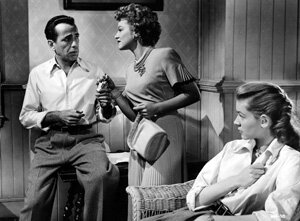 Tension builds in the movie partly because of the storm, partly because Johnny Rocco gets increasingly anxious about completing his deal, but also because of the forward and backward pull between the characters: Johnny’s will to go back to the past; McCloud and the others’ desire to break free and go forward into the future.
Tension builds in the movie partly because of the storm, partly because Johnny Rocco gets increasingly anxious about completing his deal, but also because of the forward and backward pull between the characters: Johnny’s will to go back to the past; McCloud and the others’ desire to break free and go forward into the future.
Dramatic and suspenseful, Key Largo is a tremendous example not just of good filmmaking but of good drama, period. It’s a good story well told. I loved it.
On Amazon:
- Key Largo (DVD) — Amazon.com (U.S.)
- Key Largo (DVD) — Amazon.ca (Canada)
Dirty Harry: should I like it as much as I do?
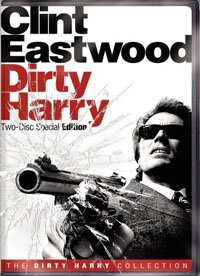 I’ve always found Dirty Harry a troubling movie. Well, almost all of the earlier, image making movies of Clint Eastwood have been troubling to me, but Dirty Harry tops my list. The reason is simple: from the first time I saw it, I’ve loved the movie but I felt that I shouldn’t.
I’ve always found Dirty Harry a troubling movie. Well, almost all of the earlier, image making movies of Clint Eastwood have been troubling to me, but Dirty Harry tops my list. The reason is simple: from the first time I saw it, I’ve loved the movie but I felt that I shouldn’t.
The conflict is easy to explain. The movie is manipulated to have you cheering for Harry so when, as in a western, the final showdown happens, there’s a cathartic moment, like scoring the winning touchdown on the last play of the game. But then you do a kind of mental double take: this guy with the big gun is actually ignoring the law, being as bad as the bad guys, and feeling justified about it because, well, they’re bad guys and he’s fighting for the good guys.
Harry is essentially a vigilante and in the movie, by creating a perverted, killing bad guy (“Scorpio”), you inevitably root for him because the emotion carries you along and your thinking side is turned off, in a manner of speaking. In his review, Roger Ebert argues that it’s essentially a fascist film, and this may be true, although I think the final scene with Harry tossing his badge in the water could be construed as meaning he’s outside the law now, no different than the criminals he’s been hunting down. It may be the movie wants you to cheer for Harry so it can then say, “Now think seriously about what you’re really cheering for.”
There are lots of people who write about Harry’s appeal to the conservative right, at least of the time (1971), and a frustration with liberal approaches to crime – respecting individual rights, in this case the criminal’s, and abandoning victims. And this may be true, too, though it should be pointed out that operating beyond the law, ignoring victims, is not something to be found on the far right of things. Some, at the far left, have had no qualms about victims when they’ve initiated a violent act for their cause. It’s an attitude that occurs at the far end of things, at extremes, be they left or right.
But what about the movie? Dirty Harry always initiates discussion about the politics of the film and often the movie itself gets overlooked.
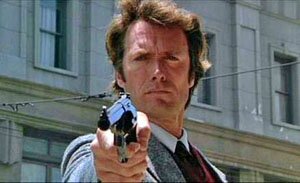 First off, I see it as an urban western, and loving westerns that may explain why I like it so much. Harry’s a loner, operating on his own (often to the exasperation of his superiors). He gets little help – some, but not a lot – and he’s after a really bad guy. So it’s framed like a moral tale, the way westerns are … but this leads us into the politics again. It is a moral tale but one a lot more subtle and ambiguous than the usual western because the good guy, well, there’s a reason they call Harry “Dirty.” (This comes up several times in the film, the question of why he’s “Dirty” Harry, with a number of possible reasons thrown out. I think that final scene with the badge is the film’s only suggestion of the real answer.)
First off, I see it as an urban western, and loving westerns that may explain why I like it so much. Harry’s a loner, operating on his own (often to the exasperation of his superiors). He gets little help – some, but not a lot – and he’s after a really bad guy. So it’s framed like a moral tale, the way westerns are … but this leads us into the politics again. It is a moral tale but one a lot more subtle and ambiguous than the usual western because the good guy, well, there’s a reason they call Harry “Dirty.” (This comes up several times in the film, the question of why he’s “Dirty” Harry, with a number of possible reasons thrown out. I think that final scene with the badge is the film’s only suggestion of the real answer.)
Another aspect I like about the movie is how very, very seventies it looks. Of course there are the clothes, the hair, the cars … but I think even more so it’s the overall look of the film. With that look, today it would be called an indie film. Despite some restoration, it still feels gritty and grainy, even when it isn’t. Not only does the movie not look slick, it almost looks anti-slick, as if it’s trying to disassociate itself from Hollywood – a characteristic of a number of movies from that period, like Taxi Driver, for instance.
I was also struck by a nice difference between Dirty Harry and its progeny, more contemporary movies with heroes and really bad villains. Today, a character like Harry would be up against an almost superhuman bad guy. But in this movie, the character of Scorpio, while very bad, is almost something of a screw up. I’m thinking of one scene where he’s out to shoot another victim but gets spotted by the police in their helicopter. Scorpio is bad, he’s dangerous, he’s sick, but he’s not a brilliant criminal mind. He’s not nearly as clever as he would like to imagine himself, and nowhere near as clever as a character such as him would be in a contemporary movie. In other words, there’s a bit more realism to Harry and his bad guy. (And realism is one of the things movies of that period aspired to.)
Finally, I believe one of the reasons this movie is so satisfying is because it understands so well set up and payoff. Like the way good jokes work, with their structure and their rhythm, there are a number of scenes in Dirty Harry that deliver the same way (for example, the “Do you feel lucky, punk?” scenes).
An interesting comparison between Dirty Harry an one of its progeny is the recent revenge film, Man on Fire, with Denzel Washington in the lead role. Whereas in Harry, directing and cinematography are almost self-effacing, with most of the emphasis on story and performance, Man on Fire is very self-consciously directed and very obvious in its cinematography, almost the exact opposite of the Don Seigal film. And whereas Harry is consumed with his hatred for bad guys and indifferent to what he does to nail them (with the possible exception of the end with the badge), Denzel’s character in Man on Fire is almost morose with awareness of being lost to the dark side and, when he goes after the bad guys, is almost like a suicide bomber, willing to do whatever needs to be done and sacrificing himself willingly as a kind of redemption. (And Denzel’s bad guy is much more clever than the Scorpio killer.)
Despite being a film from 1971 and looking very much so, Dirty Harry still works and works brilliantly. It’s just a troubling with its ambiguous politics, and just as thrilling with its cop chasing a killer suspense. I loved it.
(Note: For some of Clint Eastwood’s views on Dirty Harry, have a look at the 1974 Playboy interview, Eastwood Talks Dirty Harry. Amongst other things, when the badge scene from the movie comes up and the reference to a similar scene in High Noon, Eastwood disagees with the comparison saying High Plains Drifter is much more along the lines of the Gary Cooper film.)


